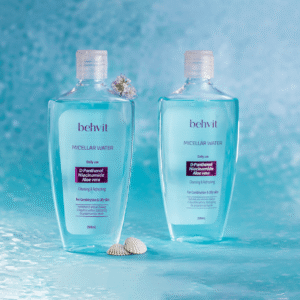دنیای مراقبت از پوست میتواند گیجکننده باشد، بهویژه با وجود تعداد بیشماری از باورهای نادرست که هم بهصورت آنلاین و هم آفلاین رواج دارند. چه با مشکلاتی مانند آکنه، پوست حساس یا جستجوی درخشش سالم روبهرو باشید، بهراحتی میتوانید تحتتأثیر تصورات نادرست رایج قرار بگیرید. در این مقاله، به افشای مهمترین افسانههای مراقبت از پوست میپردازیم تا بتوانید بر آنچه واقعاً برای پوستتان مؤثر است، تمرکز کنید.
پوست چرب نیازی به مرطوبکننده ندارد
اینگونه تصور میشود که SPF 100 دو برابر SPF 50 محافظت میکند، اما این درست نیست. در واقع، SPF 30 حدود 97٪ از اشعههای UVB را مسدود میکند، در حالی که SPF 50 حدود 98٪ و SPF 100 تنها کمی بیشتر از آن. مهمترین نکته این است که کرم ضدآفتاب را به مقدار کافی استفاده کرده و هر دو ساعت آن را تمدید کنید، بهخصوص بعد از شنا کردن یا تعریق. همچنین، دیگر اقدامات محافظتی در برابر آفتاب مانند استفاده از کلاه، رفتن به سایه یا پرهیز از ساعات اوج تابش خورشید را فراموش نکنید.

هرچه SPF بالاتر باشد، محافظت از پوست در برابر آفتاب بهتر است.
روند رو به افزایش استفاده از محصولات طبیعی در مراقبت از پوست وجود دارد، اما همه مواد طبیعی برای پوست مفید نیستند. برخی از روغنهای طبیعی مانند روغن نارگیل میتوانند منافذ پوست را مسدود کرده و باعث بروز جوش شوند، بهویژه در پوستهای مستعد آکنه. از سوی دیگر، مواد مصنوعی که بهصورت علمی آزمایش شدهاند مانند اسید هیالورونیک یا پپتیدها میتوانند فواید هدفمند داشته و معمولاً فرمولهای پایدارتری دارند. همیشه بررسی کنید که چه چیزی برای نوع پوست شما بهتر است، چه طبیعی باشد و چه نباشد.
محصولات گرانقیمت همیشه بهتر هستند
در حالی که برخی از محصولات لوکس مراقبت از پوست با مواد باکیفیت فرموله شدهاند، قیمت بالای آنها تضمینکننده نتایج نیست. بسیاری از برندهای داروخانهای مقرونبهصرفه، فرمولهای مؤثری دارند که توسط علم پشتیبانی میشوند. آنچه اهمیت دارد، مواد مؤثر است، نه نام برند یا هزینه. همیشه به دنبال موادی مانند ویتامین C، نیاسینامید یا سرامیدها باشید، صرفنظر از محدوده قیمتی.
کرم ضدآفتاب اغلب بهعنوان یک نیاز تابستانی دیده میشود، اما حقیقت این است که اشعههای UV میتوانند در تمام طول سال به پوست آسیب برسانند — حتی در روزهای ابری یا بارانی. اشعههای UVA که باعث پیری زودرس میشوند، میتوانند از میان ابرها و پنجرهها عبور کنند. بنابراین، استفاده روزانه از کرم ضدآفتاب برای محافظت از پوست در برابر آسیبهای طولانیمدت، صرفنظر از شرایط آب و هوایی، ضروری است.


